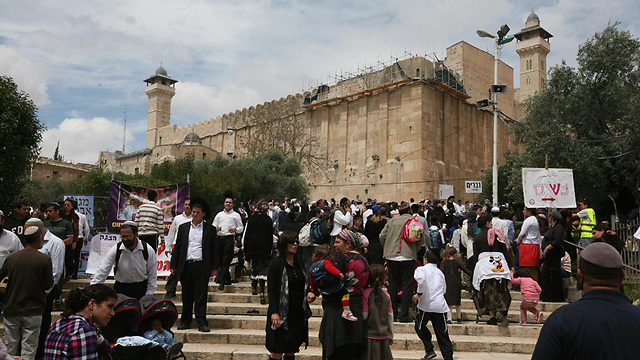Op-ed: The Arab-Palestinian side knows how to sanctify the things it deems important, while the Jewish-Israeli side’s actions convey the message to the Palestinians and to the entire world that nothing is actually sacred to us; UNESCO’s vote therefore, is hardly surprising.
The decision made by the Heritage Committee of the United Nations’ Educational, Scientific and Cultural Organization (UNESCO) on Friday to declare the Cave of the Patriarchs in Hebron a Palestinian World Heritage Site sparked reactions ranging from fury to laughter in Israel, and rightfully so. The Jewish connection to the Cave of the Patriarchs is thousands of years old and began many years before Islam was born.
The Bible, followed by Jewish tradition, talks about three places our forefathers bought for a full price. The Cave of the Patriarchs and the field in which it is located were purchased by Abraham for 400 silver shekels from Ephron the Hittite.
The plot where Joseph was buried in Nablus was bought by Jacob from the masters of the land for 100 pieces of silver. The site on which the Temple was built was purchased by King David from Araunah the Jebusite for 600 pieces of gold.

Throughout the generations, Jews attributed a great importance to these places. While the entire Land of Israel was promised to the people of Israel, from the Mediterranean Sea to the Jordan River, these three places have always been considered special. These are the places that all the people of Israel allegedly inherited.
Scientists and researchers of mysticism and spirituality find it very difficult to define the term “sanctity.” Researchers of the conflict theory, which is also known as game theory, have a very unspiritual answer to this question. In their opinion, at least in some cases, sanctity is the story that we, as a people or as a social group, tell ourselves in order to set a red line on a certain issue. When something is “sacred,” we can’t give it up even if we really want to. We can agree or disagree with this outlook, but we can’t deny the significant role that sanctity plays in battles, and especially in national battles.
The battle over the people of Israel’s historical and modern right to the places that are the cradle of the Jewish people’s existence is being waged between two very different sides. One side, the Arab-Palestinian side, knows how to sanctify the things it finds important. The other side, the Jewish-Israeli side, acts in a way that conveys that nothing is sacred. The moment that the State of Israel, as the Jewish people’s representative, is willing to put on the negotiating table issues like the sovereignty and status of the Temple Mount and the Cave of the Patriarchs, the message to the Palestinians and to the entire world is very clear: Nothing is actually sacred to us.
When on one side, the entire educational system is focused on strengthening the sacred status of the right to the land, while on the other side, talking about our right to the Temple Mount or to the Cave of the Patriarchs is considered “religionization,” we are losing the battle before it even began. In such a reality, the UNESCO ruling comes as no surprise. The real surprise is that such a ruling was only made now.
As reported by Ynetnews
